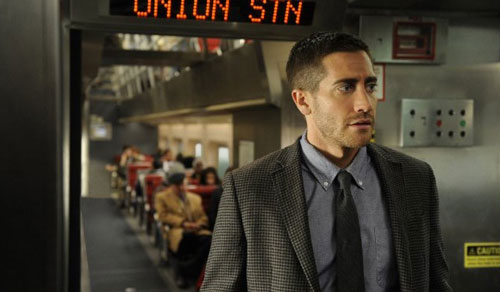
Moon, the debut from Duncan Jones, showed that the director could make a compelling science-fiction film on a shoestring. His new sci-fi thriller, Source Code, proves he is able to create smart and individualistic films even when he is working with a bigger budget for actors and effects.
Compared to Moon’s low-budget, retro style, Source Code is a high-gloss affair with expensive production values and special effects. Though the film has the sheen of a blockbuster sci-fi actioner, it has an underlying intelligence that sets it apart from most of the other films lumped into the genre.
In Source Code, Jake Gyllenhaal takes the role of Colter Stevens, a military helicopter pilot and veteran of the Afghanistan war tasked with identifying a fanatic who plans to set off a dirty bomb in downtime Chicago.
Hooked to a piece of technology called the source code, he is able to repeatedly relive the last eight minutes in the life of a man aboard a commuter train destroyed in an attack by the same bomber, and search for the terrorist. Though his superiors warn that his actions in the source code cannot change the past, Stevens becomes determined to save a young woman (Michelle Monaghan) on the train from her fiery death.

As an action-thriller, Source Code is one of the best you’ll see this year. The economical script barely wastes a moment as the film hurtles like a bullet train to its conclusion within the space of 90 minutes. Stevens’ eight-minute forays into the source code are tense and well-paced, but the events that play out in reality are just as intriguing.
The few action sequences are short and sharp. They’re there to drive the plot along and nothing else. There is none of the set-piece bloat that you’ll find in many comparable films, with Jones focusing instead on suspense and character rather than spectacle.
The science-fiction part of the film is a little less satisfying. Source Code doesn’t spend much time wrestling with the science that makes its story possible. “It’s complicated,” says Jeffrey Wright’s brilliant but hardnosed Dr Rutledge and dismisses the metaphysical and scientific questions with a wave of his hand.
Perhaps the science doesn’t matter that much in the end. Source Code is really about fate, regret and the yearning to change the past. It’s also about the marks that technology leave on the human soul and the nature of human consciousness. They’re weighty topics, handled with a restraint that has become all too rare in Hollywood films.
Gyllenhaal is a suitably heroic and bewildered protagonist, while Monaghan is charming as the vivacious doomed girl. There’s a believable chemistry between the pair that helps to make the movie work. The real standout performance comes from the always-reliable Vera Farmiga as a military officer whose steely demeanour masks a soft heart.
Source Code trailer (via YouTube):
Much like Steven Spielberg’s Minority Report, Source Code arrives at an ending that seems at first pat and trite. But the payload arrives a few seconds later as the implications explode in your brain. The biggest bang comes from Source Code’s ideas rather than its explosions. — Lance Harris, TechCentral
- Subscribe to our free daily newsletter
- Follow us on Twitter or on Facebook

